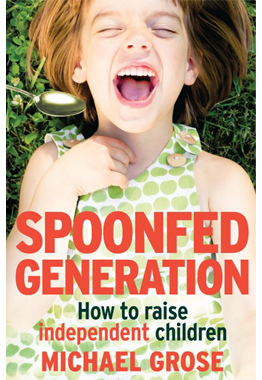By Michael Grose
Parents and teachers often ask me how to build resilience in kids.
My response is always the same. “Start by building independence and resilience will follow.”
Children are hard-wired for independence
Sometime around the age of fifteen months (give or take three months) most children will make a strong case for self-sufficiency. They demand to do things their own way. This demand is soon backed by a strong voice – “NOOOO!” – and the more articulate cries of “I can do it!” as their third birthday approaches.
This is the time to harness their push for independence and self-sufficiency. Their push for independence will see most children take incredible physical risks in the form of play, the exploration of their immediate environment and their wish to gain mastery over their environment. Concerned parents will naturally minimise risks by moving furniture around, keeping doors closed and hiding sharp implements at home, to name a few protective measures. But parents can’t eradicate all risks. They recognise that kids will fall and hurt themselves but they’ll also get up and go again. In time, they’ll learn to assess situations, stare down their fears and test themselves out in new situations. Falling down, brushing yourself off and trying again is part of the natural learning experience for most young children. Parents don’t have to do much more than assess a situation for real dangers, stand back and allow kids to explore their environments and pull them up when their play and explorations transgresses the rights and peace of others.
So what’s this got to do with resilience?
Well, everything really. Independence is the pursuit of mastery over one’s self and one’s environment and it rarely happens without mishaps and mistakes. It nearly always involves hurt, hardship, frustration and fear. That’s where resilience comes in. Resilience is the art of bouncing forward after experiencing aforesaid hurts, hardships, frustrations and fears. Resilience is what comes from seeking out self-sufficiency and independence.
The language of Independence
The fact that there’s a whole genre of language devoted to resilience (and it’s mostly cloaked in cliché) is no accident. Terms such as “get back on the bike/horse when you fall off”; “come on, brush yourself off and get on with it”; “what doesn’t kill you makes you stronger” are built into the psyche of past generations. Many parents today will cringe at these terms as they appear a little callous and out of touch. Conversely the current relationship with risk and adventure (both required for independence-building), that many parents have is very tenuous at best, non-existent at worst.
Therein lies the challenge. I haven’t met a parent, carer or teacher who doesn’t want the children in their care to develop resilience that will last a lifetime. Yet, many of those same adults will block the pathway to children’s resilience by over-indulging, solving their problems and not giving them real responsibility. In doing so they deny kids the sense of mastery that comes from sorting out their own problems, getting themselves out of jams and getting up after a fall.
You can never love your children too much; but you can love them helplessly. That’s what happens when we deny kids the opportunity to become truly independent and self-sufficient. Deny self-sufficiency and you block a child’s resilience. Develop real independence and you open the pathway to resilience that will last a lifetime.

Find out how to develop real independence and resilience in your child in my latest book Spoonfed Generation: How to raise independent kids.
You’ll find more great ideas to nurture a close, loving family in my book Spoonfed Generation: How to raise independent children.
Get your copy at our online shop. www.parentingideas.com.au/product/spoonfed-generation


